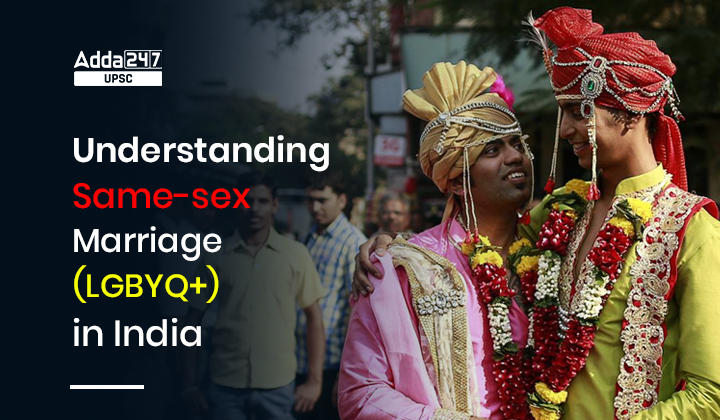Table of Contents
Same-sex Marriage (LGBYQ+) UPSC Relevance
Same-sex Marriage (LGBYQ+): Same sex rights are important aspects of the evolving social context in India. Same-sex Marriage (LGBYQ+) is important for UPSC Prelims Exam 2023 and UPSC Mains Exam (Social Issues in India).
Same-sex Marriage (LGBYQ+) in News
- Recently, a Supreme Court Bench issued notices to the Centre and the Attorney General of India, seeking their response to two petitions filed to allow solemnisation of same-sex marriage under the Special Marriage Act (SMA) 1954.
What is the Petition regarding Same-sex Marriage (LGBYQ+)?
- One of the petitions argues that the recognition of same-sex marriage was only a “sequel” or a continuation of-
- The Navtej Singh Johar judgment of 2018 (decriminalising homosexuality) and
- The Puttaswamy judgment of 2017 (affirming the Right to Privacy as a fundamental right).
- Solicitor General Tushar Mehta for the Centre had said that as per the law, marriage was permissible between a “biological man” and “biological woman”.
What is Special Marriage Act (SMA) 1954?
- The SMA provides a civil form of marriage for couples who cannot marry under their personal law, and both the recent pleas seek to recognise same-sex marriage in relation to this Act and not personal laws.
What do the petitions on Same-sex Marriage say?
- Their petition argued that the SMA was “ultra vires” the Constitution “to the extent it discriminates between same-sex couples and opposite-sex couples”.
- It stated that the Act denied same-sex couples both “legal rights as well as the social recognition and status” that came from marriage.
- The petitioners emphasised that the SMA “ought to apply to a marriage between any two persons, regardless of their gender identity and sexual orientation”.
- Their plea pointed out that while Section 4 of the SMA permitted the solemnisation of marriage between any two persons, a subsequent section placed restrictions.
What is the government’s stand?
- Late last year, while responding to the pleas seeking recognition of same-sex marriages in the Delhi High Court, Solicitor General Tushar Mehta for the Centre had said that as per the law, marriage was permissible between a “biological man” and “biological woman”.
- In its affidavit opposing the pleas, the Centre had said: “The acceptance of the institution of marriage between two individuals of the same gender is neither recognised nor accepted in any uncodified personal laws or any codified statutory laws”.
- It also argued against the urgency of the pleas by saying nobody was “dying” in the absence of a marriage certificate.
What about other countries?
- A total of 32 countries around the world have legalised same-sex marriages, some through legislation while others through judicial pronouncements.
- Many countries first recognised same-sex civil unions as the escalatory step to recognise homosexual marriage.
- Civil unions or partnerships are similar arrangements as marriages which provide legal recognition of unmarried couples of the same or opposite sex in order to grant them some of the rights that come with marriage — such as inheritance, medical benefits, employee benefits to spouses, managing joint taxes and finances, and in some cases even adoption.
- The Netherlands was the first country in 2001 to legalise same-sex marriage by amending one line in its civil marriage law.
- In some countries, the decriminalisation of homosexuality was not followed for years by the recognition of same-sex marriage, for instance, in the U.S. the former happened in 2003 while the latter in 2015.




 TSPSC Group 1 Question Paper 2024, Downl...
TSPSC Group 1 Question Paper 2024, Downl...
 TSPSC Group 1 Answer key 2024 Out, Downl...
TSPSC Group 1 Answer key 2024 Out, Downl...
 UPSC Prelims 2024 Question Paper, Downlo...
UPSC Prelims 2024 Question Paper, Downlo...




